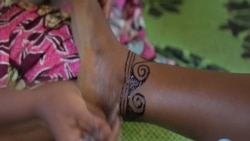Saadatu Ahmed Manga is getting ready for her wedding. She’s a 38-year-old school teacher living near Yola, a quiet city in northeastern Nigeria. She and her friends are preparing for the big day.
“We went to the hairdresser. Now we are doing lalle,” she says with a smile. “For every wedding, the bride does lalle.”
Lalle, more popularly known as henna, is a dye made of plants with some synthetic ingredients added. It’s painted on the body in flowery and geometric patterns.
Lalle is a wedding custom popular among Muslim women around the world and while lalle is important, in the culture of northern Nigeria, which is largely influenced by Islam, the most important wedding custom is the bride price, or “sadaki” in the Hausa language of northern Nigeria. It’s a cash payment that Manga’s fiance will give to her through her family.
“In Islam, the bride price has to be paid before the wedding,” she said. “Bride price started since the days of the Prophet Muhammad, may peace be upon him, and we continue it,” Manga told VOA.
Manga’s fiance met with his male relatives and that of Manga’s in a mosque to negotiate the bride price. After a quick deliberation, everyone agreed the price would be about $56.
Weddings are big business
Getting married in Nigeria is big business. The wedding industry generates millions of dollars. But for many Nigerians across all religions, it’s neither the fashion nor the glamour that symbolizes a wedding. It’s the payment of the bride price. If the bride price is not paid, the couple do not marry. The tradition dates back more than 2,500 years, according to anthropologists and cultural historians.
VOA met people at a busy market in Yola to gather opinions about the bride price.
One man by the name of Isa Mohammed said, “Bride price is something God has made compulsory.”
Another said the bride price is not about selling a woman. It actually honors her.
“It’s a respect to the parents or people to come to take their child so they deserve to honor them,” 32-year-old Glory Ihezie said. “For me, any man that is coming to marry me without paying my bride price, I don’t think I will go with the man.”
Lucy Tuku, 24, also expressed support.
“I think it’s right,” she said. “I think that’s the only way you can show a lady, to appreciate the love you have, to show how much you love her.”
Critical voices
But more people have begun to condemn the practice, describing it as dehumanizing because it seems to commodify women. Such critical voices can be heard across Africa and include scholars, feminists, religious leaders, public intellectuals, artists and activists.
In South Africa, young women are voicing their concerns about the bride price, known there as lobola. Some are even demanding it be abolished, while others try to bypass the exorbitant costs by cohabitating with their partners rather than going through the traditional marriage rites. Lobola negotiations can take months, and the payment is often in the form of cows. Ten cows are typically the standard minimum.
Sihle Hlophe, a documentary filmmaker living in Johannesburg, directed the 2019 film, “Lobola: A Bride’s True Price?” that explores the practice of bride price by following her own marriage journey.
Stephen Baffour Adjei, a social, cultural and developmental psychologist and a lecturer and researcher at the University of Education in Kumasi, Ghana, claimed in a 2018 study, that bride price “has both social and psychological implications for the men who pay and for the women for whom it is paid,” specifically that “psychologically, the practice created an ownership mentality in men” which could lead men to “see their wives as their purchase over whom they exercise unfettered authority, including physical and psychological abuse.”
In the case of women, Adjei’s report said, “The definition of women’s identities, and their sense of self-worth in marriage, was determined by men through the payment of bride price.”
Tradition commercialized
Award-winning Nigerian author Chimamanda Adichie said at a public event that the bride price is “disgusting” because of the way it has been commercialized in recent times, noting that she feels conflicted about the practice.
In October, Nigerian media outlets reported the death of a 17-year-old girl in northern Nigeria, more than six weeks after setting herself on fire because her boyfriend could not afford the bride price. It was set at less than $50.
The tragic incident was extremely rare, but not well publicized and largely dismissed with the assumption that other factors must have led to the girl’s suicide. But it’s the type of tragedy that Christian marriage and relationship counselor Fiyabina Penuel said can and should be avoided. She believes the bride price custom has been abused over the years as it has been passed down from generation to generation.
“Initially, this issue of dowry and bride price was more like a pleasantry being exchanged between the husband-to-be and the future in-laws. When it all started, in most cultures it was little things that everyone could afford. But as time went on, it became so big that most people were not able to afford it,” she said.
“So it’s like business and using it to put people in classes,” she added.
African literature scholar Agatha Ukata blames radical feminist ideology for the rising criticism of bride price. She also says the tradition is misunderstood by the Western world.
“The Western world, they have this cultural shock because it is not in their culture to have bride price, and so that’s why they look at bride price and they’re imagining, ‘Why do you have to buy a woman?’ The concept of bride price, on its own, it’s not buying somebody. It is just a symbol of love,” she told VOA.





